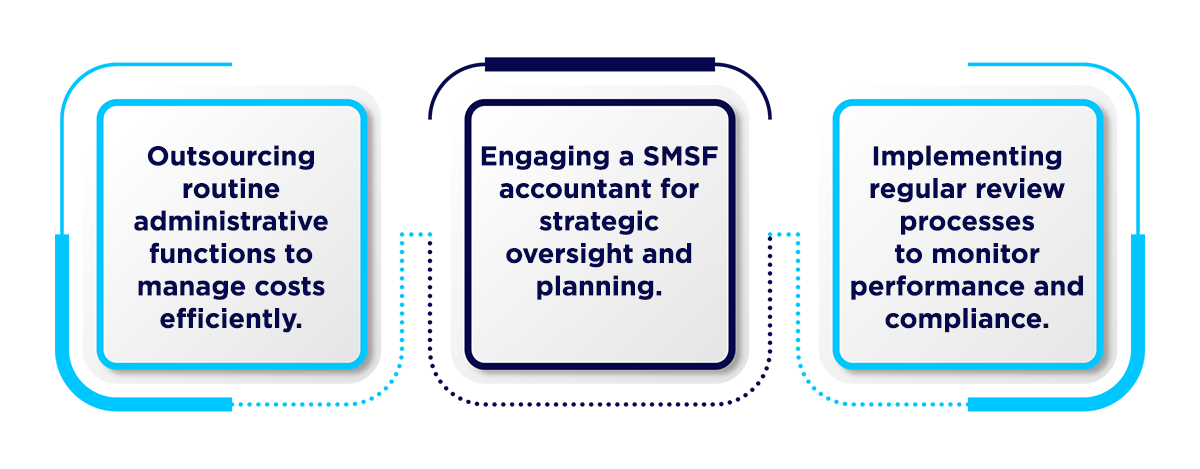Managing a Self-Managed Super Fund (SMSF) involves significant responsibility and financial expertise. If you’ve already set up an SMSF or are considering this path for your retirement planning, you’ve likely asked yourself:
“Do I really need an SMSF accountant if I’m already outsourcing administration?”
It’s a practical question — and the answer depends on how you balance compliance, cost, and long-term fund performance. Let’s explore what trustees actually need and how to structure your SMSF management effectively.
Understanding the SMSF Accountant role
An SMSF accountant does far more than bookkeeping. They bring specialised knowledge of superannuation law, taxation frameworks, and ATO compliance, ensuring your retirement fund remains both compliant and optimised.
Core responsibilities include:
- Preparing and lodging annual financial statements and SMSF tax returns
- Managing tax optimisation and contribution strategies
- Ensuring compliance with current ATO and SIS Act requirements
- Coordinating and preparing for the annual SMSF audit
- Maintaining compliant record-keeping systems
- Advising on investment structures and long-term fund strategies
The Australian Taxation Office (ATO) maintains strict oversight of SMSFs, and any breach of compliance can lead to severe penalties, suspension of fund concessions, or even trustee disqualification.
An SMSF accountant helps you stay compliant while keeping your fund strategically aligned with your retirement goals.
The Outsourcing consideration
Outsourcing SMSF administration has become increasingly popular, especially for trustees seeking efficiency and cost savings.
When you outsource SMSF administration, you typically receive support for:
- Transaction processing and reconciliation
- Member record maintenance
- Asset valuations and updates
- Preparation of standard compliance documentation
However, there’s a crucial distinction. Outsourced providers handle day-to-day operations well but usually lack the strategic financial and regulatory expertise needed to maximise fund performance or navigate complex legislative updates.
Outsourcing ensures accuracy and timeliness — but it doesn’t replace the professional judgment and strategic insight of a qualified accountant.
Why an SMSF Accountant Still Matters
Even if your SMSF’s administrative tasks are outsourced, there are several reasons why a dedicated accountant remains invaluable.
1. Navigating Complex and Evolving Regulations
Superannuation laws frequently change, and keeping up with ATO updates can be challenging.
While outsourcing providers follow established processes, they may miss nuanced regulatory shifts that could affect your compliance status.
An SMSF accountant stays ahead of these changes, helping trustees meet obligations confidently and avoid fines.
2. Strategic Tax Planning and Optimisation
Outsourcing ensures compliance, but tax optimisation requires expertise.
A qualified SMSF accountant can identify legitimate tax minimisation opportunities, structure investments for after-tax efficiency, and ensure the fund leverages every available concession.
Often, these strategic savings outweigh the accountant’s professional fees.
3. Streamlining the Audit Process
Every SMSF must undergo an annual independent audit. Without proper preparation, this process can become stressful and time-consuming.
An experienced accountant understands auditor expectations and ensures that all documentation meets ATO standards before submission — minimising queries, delays, and risks of non-compliance.
4. Investment Strategy Development
While outsourcing providers focus on administration, accountants provide strategic insight into how your investments align with your risk profile, liquidity needs, and retirement goals.
They can recommend compliant investment structures that strengthen fund performance over time.
Cost vs Value: The Real Comparison
Outsourcing SMSF accounting can appear cost-effective, often reducing fees by 20–40% compared to comprehensive accounting services.
However, lower cost doesn’t always equal better value.
| Aspect | Outsourced Admin | SMSF Accountant |
|---|---|---|
| Compliance & reporting | Standard processing | Deep regulatory expertise |
| Audit support | Documentation only | Full audit preparation |
| Tax planning | Limited | Strategic optimisation |
| Investment advice | Not included | Tailored to fund objectives |
| Cost | Lower | Moderate to higher |
| Overall value | Operational | Strategic & compliance-driven |
The real metric isn’t fee minimisation — it’s total fund performance after costs.
Strategic accounting often delivers tangible financial gains through tax savings, compliance accuracy, and improved investment outcomes.
Finding the Optimal Approach: The Hybrid Model
For most SMSF trustees, the most effective structure typically involves:

This balanced approach delivers the operational benefits of outsourcing SMSF accounting tasks while retaining access to professional financial guidance that can substantially enhance long-term outcomes.
Decision framework
When determining whether to engage an accountant alongside outsourced services, consider:
- The complexity of your investment portfolio
- Your personal understanding of superannuation legislation
- The scope and limitations of your current outsourced service
- Your capacity to monitor compliance requirements
- The potential financial advantages of professional guidance
For many trustees, the professional assurance provided by accounting expertise delivers significant value, particularly when considering the substantial penalties associated with breaches of ATO SMSF regulations.
Decision Framework: What Trustees Should Consider
Before deciding whether to outsource or hire an accountant, review these key factors:
- The complexity of your investment portfolio
- Your personal understanding of superannuation legislation
- The scope and limitations of your current outsourced provider
- Your capacity to oversee compliance independently
- The financial benefits of strategic accounting input
For many trustees, professional accounting oversight offers peace of mind that outweighs the additional cost — especially given the severe penalties for ATO non-compliance.
How to Choose the Right SMSF Partners
When selecting your accountant or outsourced provider, look for:
- Proven SMSF experience and registration with ASIC or CPA/CAANZ
- Strong understanding of ATO reporting systems and compliance
- Transparent pricing with clear inclusion lists
- Secure cloud software (e.g., Class, BGL, or Simple Fund 360)
- Audit support and proactive communication
These checks ensure your SMSF partners deliver reliability, compliance, and confidence.
Key Takeaways
- Outsourcing Accounting services improves efficiency but lacks strategic oversight.
- SMSF accountants add value through compliance, tax optimisation, and audit support.
- The hybrid approach—outsourcing for admin and accounting for guidance—offers the most balanced solution.
- Trustees remain legally responsible for compliance regardless of outsourcing.
- Strategic accounting can transform SMSF management from basic compliance to long-term wealth creation.
Conclusion
While outsourcing administrative functions undoubtedly streamlines SMSF record-keeping, it typically doesn’t replace the strategic value provided by a qualified accountant.
Many self-directed funds underperform their potential because they prioritise cost minimisation over strategic guidance. An experienced self-managed super fund accountant helps maintain focus on long-term financial outcomes rather than merely administrative compliance.
Consider your priorities – immediate cost reduction versus potential long-term fund growth. For most trustees, combining efficient outsourced administration with targeted accounting expertise represents the most balanced approach to SMSF management.
Frequently Asked Questions
Can all SMSF functions be effectively outsourced?
Yes, practically all administrative and accounting functions can be outsourced. However, trustees should remember that ultimate legal responsibility for fund compliance with ATO SMSF regulations remains with them regardless of service provider arrangements.
What cost efficiencies can typically be achieved through outsourcing?
Most trustees report approximately 20-40% cost savings from outsourced SMSF accounting compared to comprehensive accounting services. However, this comparison should include consideration of potential missed strategic opportunities.
What distinguishes SMSF administration from accounting services?
Administration generally encompasses transactional processing, record maintenance, and basic compliance functions. Accounting services include financial statement preparation and return lodgement, but more importantly, they also incorporate strategic advice on regulatory and compliance optimisation.
Do outsourced providers manage the audit requirement?
Most outsourced services will prepare documentation for audit and may coordinate with independent auditors, but cannot perform the audit function themselves. Legislation requires engagement of an independent approved SMSF auditor annually.
How can trustees verify outsourced service quality?
Regular review of SMSF financial statements and compliance documentation is essential. Many trustees benefit from having their accountant periodically review outsourced work products – providing an additional layer of professional oversight for critical retirement assets.
Parul is a content specialist with expertise in accounting industry. Her writing covers a wide range of domains such as, Accounts Payable, Accounts Receivables, Bookkeeping and more. She writes well-researched content and has a strong understanding of accounting terms and industry-specific terminologies. As a subject matter expert, she simplifies complex concepts into clear, practical insights, helping businesses with accurate tips and solutions to make informed decisions.







